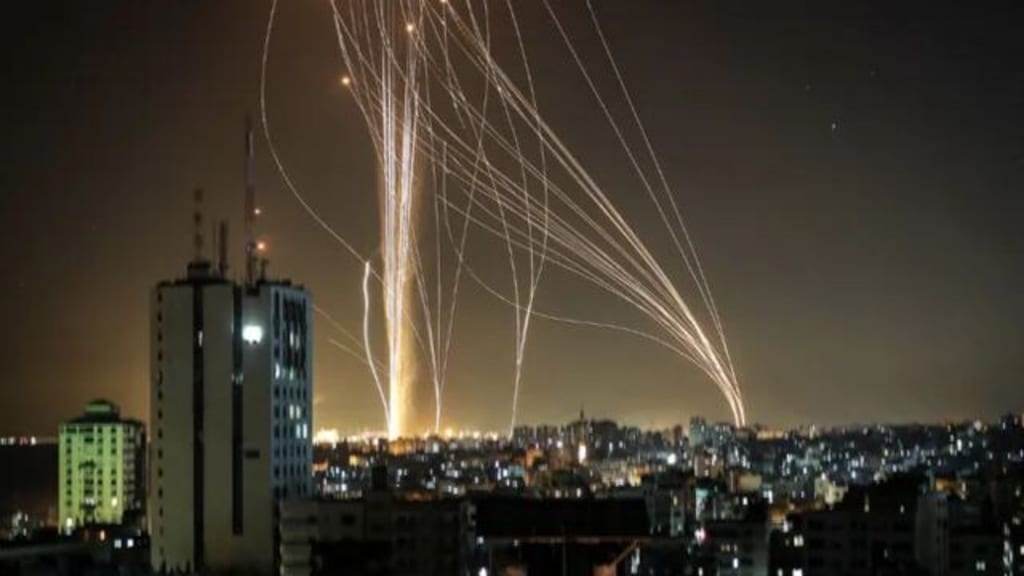Israel's Response: Shooting Down Missiles and Drones After Iran's Unprecedented Attack - A Closer Look
Unraveling the Crisis in the Middle East

In the wake of Iran's unprecedented strike on strategic targets, Israel has swiftly responded by deploying its advanced missile defense systems and employing a multi-faceted approach to intercept incoming missiles and drones. This in-depth analysis aims to delve into Israel's reaction, highlighting the various measures taken to neutralize the threat and safeguard its national security.
First and foremost, Israel's Iron Dome missile defense system has played a pivotal role in intercepting incoming projectiles. Developed by Israeli defense companies, this advanced system utilizes radar detection and tracking technology to identify and intercept short-range rockets and artillery shells. Iron Dome's high success rate in intercepting threats has proven crucial in protecting Israeli civilians and critical infrastructure.
Additionally, Israel has employed its Arrow missile defense system, designed to intercept long-range ballistic missiles. Developed in collaboration with the United States, Arrow provides an additional layer of defense against potential threats originating from Iran or other hostile actors in the region. Its advanced radar capabilities and interceptor missiles have demonstrated their effectiveness in countering long-range missile attacks.
Furthermore, Israel has utilized its aerial superiority to neutralize incoming threats. The Israeli Air Force (IAF) has conducted preemptive strikes on missile launch sites and drone facilities, aiming to disrupt Iran's offensive capabilities. These targeted airstrikes have not only eliminated immediate threats but also served as a deterrent, sending a clear message to Iran that any aggression will be met with a swift and decisive response.
In recent years, Israel has also developed a robust drone defense system to counter the growing threat posed by unmanned aerial vehicles (UAVs). This system combines radar detection, electronic warfare capabilities, and kinetic interception methods to neutralize hostile drones. By effectively detecting and intercepting enemy drones, Israel has mitigated the potential damage they could inflict on critical infrastructure or military installations.
Moreover, Israel has leveraged its intelligence capabilities to identify and neutralize potential threats before they materialize. Through a combination of human intelligence, signals intelligence, and advanced surveillance technologies, Israel has been able to gather actionable intelligence on Iran's offensive capabilities. This intelligence-driven approach has allowed Israel to proactively intercept missiles and drones, preventing potential damage and casualties.
It is worth noting that Israel's reaction to Iran's unprecedented strike has not been limited to defensive measures alone. The Israeli government has also engaged in diplomatic efforts to garner international support and condemn Iran's aggression. By highlighting the threat posed by Iran's actions, Israel aims to rally global support and solidarity, reinforcing the notion and kinetic interception methods to detect and neutralize hostile drones. Israel's expertise in drone technology has allowed it to develop effective countermeasures, including jamming signals to disrupt drone communication and using interceptor drones to physically intercept and disable hostile UAVs.
Moreover, Israel has leveraged its intelligence capabilities to identify and track potential threats in real-time. Through a network of surveillance satellites, ground-based radars, and advanced intelligence gathering techniques, Israel can closely monitor Iran's activities and anticipate potential missile launches or drone attacks. This proactive approach enables Israel to respond swiftly and effectively, minimizing the risk to its population and infrastructure.
In addition to its defensive measures, Israel has also taken diplomatic and political steps to address the threat posed by Iran. It has engaged in international forums to raise awareness about Iran's aggressive behavior and garner support for sanctions and other measures to curb its military capabilities. Israel's close alliance with the United States has been instrumental in coordinating efforts and sharing intelligence, further enhancing its ability to respond to threats.
Overall, Israel's reaction to Iran's unprecedented strike has been comprehensive and multifaceted. By deploying advanced missile defense systems, conducting targeted airstrikes, developing drone defense capabilities, leveraging intelligence assets, and engaging in diplomatic efforts, Israel has demonstrated its commitment to safeguarding its national security and protecting its citizens. This in-depth analysis highlights the effectiveness of Israel's response and underscores the importance of a proactive and multi-layered approach to countering emerging threats in the region.





Comments
There are no comments for this story
Be the first to respond and start the conversation.